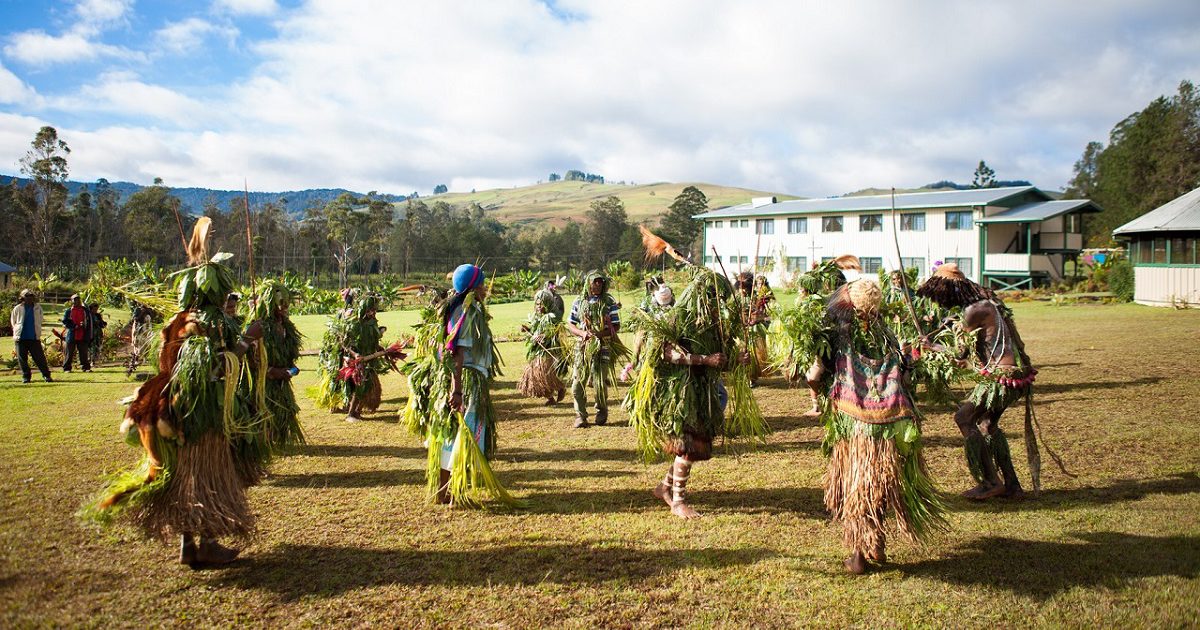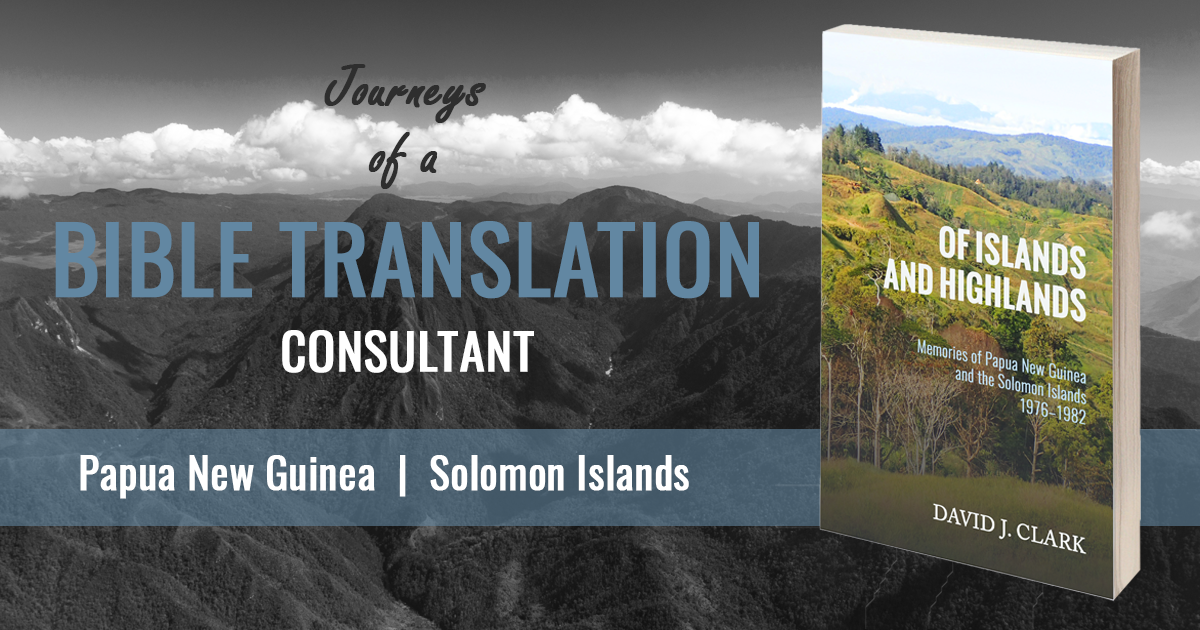
Things work differently in foreign and remote places. Missionaries have the unique experience of learning about these cultural differences first hand, just as Bible translation consultant David Clark had the opportunity to learn the Oceanic lifestyle during his seven years in Papua New Guinea.
In his new book detailing these years, Of Islands and Highlands, he recalls several lessons he learned about customs and culture, some of which entertained him and some of which terrified him. So, straight from Clark’s memoir, you know you’re in Papua New Guinea when…
The Radio Station Can’t Find the News
The PNG national radio broadcast usually began with “This is the PNG Broadcasting Corporation. Here is the news.”
This was usually followed by the actual news, but on one occasion, it was followed by a pause, then the announcement, “Augustine is just running down the corridor with the news. Ah, here it is.” On another occasion there was a longer pause, then the announcer proclaimed cheerfully, “Well, we can’t find the news, so here is some more music instead.” This was all part of the delightful informality of life in the South Pacific.
The French Missionary Dies Building a Wine Cellar
As Clark was attending a meeting with several French missionaries, three of the priests began telling him about the history of their mission station. The founder had died at the station, so Clark asked them how, thinking he had been martyred.
With great solemnity I was informed in a disarming French accent, “’E was digging a wine cellaire, and it collapsed on top of ’im.” My hosts all looked very serious, but to me the news was so unexpected that I found it very difficult to maintain a solemn and sympathetic demeanor and not to laugh out loud. I wonder how many Protestant missionaries have ever been killed by a collapsing wine cellar?

The Flight Runs Out of Beer
Clark’s memoir is filled with accounts of missed or delayed flights and some frightening moments. On one flight, the stewardess announced,
“I’m afraid we’ve got bad news for you, ladies and gentlemen.” The immediate thought that came into my mind, and no doubt not only mine, was that we should have to return to Kowanyama, and even spend the night there waiting to be rescued. But then the stewardess continued solemnly, “We’ve run out of beer!” A very Australian problem, but fortunately not one that caused any further disruption to travel plans.
The Pilot Seems to Have Gone Kamikaze
On one short flight over a bay, Clark was sitting in the seat next to the pilot. After buzzing the landing strip to ensure it was clear, the pilot did not do the expected and circle around to land from the sea. Instead,
he turned and began his landing approach on a course parallel with the strip but on the other side of a low range of hills, out of sight of the strip. As we were in fact heading straight for another higher range of hills that was dead ahead, I began to wonder what he was up to, and was starting to get a bit twitchy. But at what seemed to me alarmingly close to the last minute, he turned through a gap in the range on our left that had been invisible to me, and landed safely towards the sea rather than away from it. There’s a potent sermon illustration there – you always have to trust the pilot, especially when you don’t know the way ahead!
Familial Relations Work Differently
A rather touching story came from the family of a man named Inoke, who had been adopted.
As his birth mother had several children and her sister had none, his birth mother was obliged by local custom to give her one, and so at the age of three Inoke was given to his aunt, and brought up by her and her husband. Thus he was still within his extended family, and the arrangement seems to have worked well, as there was obviously a very warm relationship between him and his adoptive parents, and although they had had no advance warning of our visit, they made us very welcome and of course fed us generously!
The Hotel Isn’t Super Accommodating
While the hotel that Clark and his colleague Ray stayed in one night was rather empty, it was not the peaceful paradise they would have preferred. At 6 am, a loud alarm went off in an adjacent room, which woke up Ray (but didn’t bother Clark). After Ray arose to get the noise turned off,
He managed to find some sleepy staff member, and gathered that the cleaners would put the radios on in the guest rooms during the day and forget to switch them off…. Ray managed to persuade the staff member to find a master key and enter one unoccupied room to switch the radio off. Only when he returned to our room did he realise that the door of the room was self-locking, and as he had not taken our key with him, he could not get back in. He hammered on the door but I continued to sleep happily through the noise. Eventually, and still in his pyjamas, he had to go and find the hotel staff member again and persuade him to open our door. At last he was able to lie down in relative peace. Then he became aware that the radio was now blaring away in some other room, and he still could not get back to sleep. At this point he was so wide awake that he gave up and did not go to bother the staff member again! When we eventually went to breakfast and he recounted his misadventures, I rejoiced that this was one of the few occasions on which my deafness had proved a distinct advantage!
The Seminarians Used to Be Cannibals
Clark arrived in a region of PNG where a translation into Bedamuni was underway.
At that time the people there had still been active cannibals, and the coming of the gospel had made a huge difference to their lifestyle. The missionary involved, an Australian called Tom Hoey, had been the first European to settle in the area. He was a very practical man and had started such enterprises as a cattle ranch, a saw-mill, a Bible school and of course an airstrip. At the time of the workshop, in 1980, he was still able to say “every person in my Bible school has tasted human flesh.” How many other Bible schools anywhere in the world could have made that claim?
Local Christians Are Eager for God’s Word in Their Language
Some of the more impressive passages throughout Of Islands and Highlands include those that tell of the eagerness of the locals to have God’s Word in their language. Clark recounts a memorable service where the people gave sacrificially to the translation workers in the area:
One of the services was a communion service, and it was interesting to see that the elements were sago cake and coconut milk, as truly representative of the staple food of the area as the original bread and wine were in the Holy Land. Again the local church took up a collection for the Bible Society, and although the amount was not large in absolute terms, I was told it was unusually generous in terms of the local economy. Such quiet testimony to the eagerness of the local Christians to have God’s Word in their own language was a truly heartening climax to the trip.
For More Tales of PNG…
Maybe you won’t get a chance to visit Papua New Guinea on your own, but David Clark will take you on a journey through the PNG highlands and the nearby Solomon Islands, where he labored on behalf of the locals to help get Scripture into their languages for seven years.
Preview or Buy Of Islands and Highlands.

